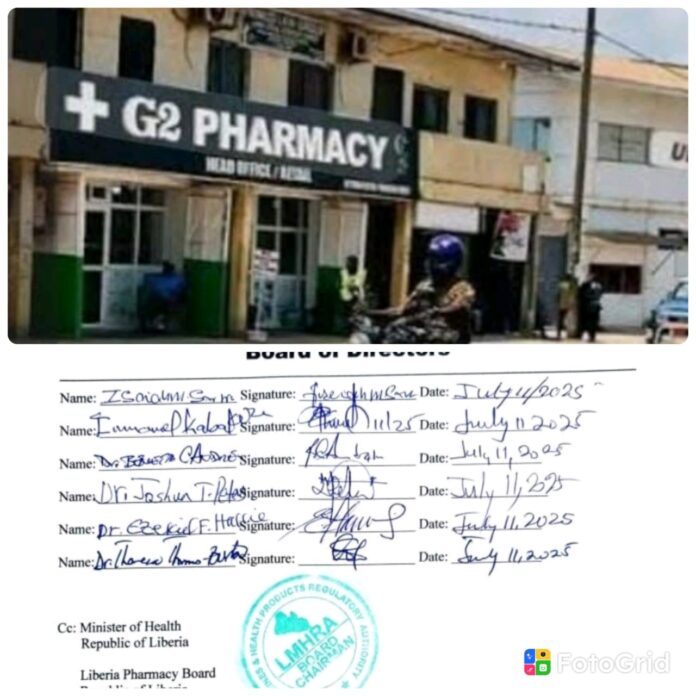In a development sending shockwaves across Liberia’s healthcare and pharmaceutical sectors, the Liberia Medicines and Health Products Regulatory Authority (LMHRA) has indefinitely suspended the import license of G2 Pharmacy following the discovery of unauthorized and unlabeled medications, one of which is linked to a fatal medical error.
The LMHRA, acting through its independent hearing board, announced the decision after a months-long investigation that began on January 22, 2025, in response to a complaint involving the death of a patient due to an improperly labeled anesthetic—Bupivacaine 0.5%.
According to LMHRA’s findings, G2 Pharmacy imported and distributed the drug across Liberia, including to major health facilities such as Catholic Hospital, C.H. Rennie Hospital in Kakata, and JFK Medical Center. The drug was not labeled in English, a clear violation of national pharmaceutical regulations requiring English-language labeling for safety and transparency.
This incident reveals deep flaws in pharmaceutical import practices, and spotlights broader systemic risks within Liberia’s medical supply chain. Bupivacaine, a powerful local anesthetic, can be dangerous if not properly dosed or administered. Without proper labeling, dosage instructions, and warnings in English, healthcare professionals are left to make high-stakes decisions based on guesswork—an outcome that has now proven fatal.
In its response, the LMHRA revoked G2 Pharmacy’s import license for an indefinite period and levied a fine of $500 per mislabeled pack. With 236 packs under scrutiny, the total fine amounted to $118,000. However, G2 Pharmacy has reportedly paid only $1,000 so far, raising additional concerns about the company’s accountability and willingness to cooperate with regulatory authorities.
The LMHRA, established in 2010 under the National Drug Policy, is tasked with ensuring all medicines and health products in Liberia are safe, effective, and high-quality. Its inspectorate and pharmacovigilance departments acted swiftly, but this incident exposes a gap between policy enforcement and actual compliance.
This is not the first time G2 Pharmacy has been implicated in the distribution of unknown and unregistered medications. Past allegations of importing and selling questionable pharmaceutical products have surfaced, but enforcement actions have been limited. The latest findings renew calls for deeper scrutiny into G2’s operations and for stronger regulatory oversight across the board.
Public health advocates, regulatory stakeholders, and members of the medical community are now urging the Ministry of Health, the Liberia Medical and Dental Council (LMDC), and the LMHRA to launch a comprehensive investigation not only into G2 Pharmacy but into the broader pharmaceutical import sector. At stake is the integrity of the nation’s drug supply—and the lives of Liberian patients.
This scandal also raises critical questions about the processes by which hospitals, including government-run institutions, procure their medications. If unauthorized or improperly labeled drugs can pass through national borders and end up on the shelves of Liberia’s largest hospitals, then systemic vulnerabilities in procurement and verification processes must be addressed urgently.
As Liberia approaches 178 years of independence, President Boakai and health sector leaders now face a pivotal moment: will this tragedy spark a long-overdue overhaul of Liberia’s medicine regulation systems, or will it fade into the background like so many others before it? Until stronger mechanisms are put in place, the safety of medicines in Liberia remains dangerously uncertain.



